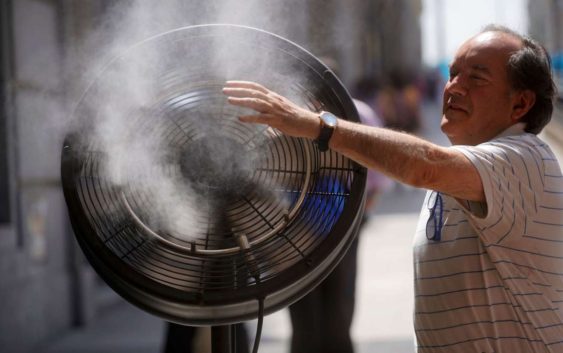- Governor Sanwo-Olu flags off Ojota-Opebi Link Bridge, to be completed in 20 months
- Allow Nigeria go to 2022 World Cup, don’t play qualifiers – Ghana Parliament member tells Black Stars
- There was no second sex tape, Kim Kardashian refutes Kanye West’s claims
- Jaruma Remanded In Prison Over Post On Regina Daniels And Ned Nwoko
- Lanre Gentry confirms paternity of last son with Mercy Aigbe, says ‘He’s my son’ (Photo)
Paris bans 60% of cars as heatwave continues to roast Europe

Europe continues to endure record-breaking temperatures as hot air from the Sahara engulfs the continent.
France, Germany, Poland and the Czech Republic have set temperature records for June and Spain has been trying to contain a major wildfire in the country’s north east.
The French capital has seen temperatures soar past 40C (104F) and the local council has banned up to 60% of its cars to limit pollution that has been made worse by the heat.
Older and less efficient cars have been banned within the A86 second ring-road – which includes Paris and 79 towns around it – for as long as the hot weather lasts.
Only electric or hydrogen vehicles, petrol cars registered after January 2006 and diesel cars registered from January 2011 are allowed on the roads.
Some five million cars are affected, according to data firm AAA Data, but several drivers say they are ignoring the restrictions because the fines (€68 or £61 per car) are so low.
French politician Francois Ruffin posted a video to Twitter of himself criticising colleagues for travelling to a climate change debate by car, many having travelled only a few kilometres, he said.
There are also restrictions on vehicles in Lyon, Marseille and Strasbourg.
Also, some schools have postponed exams, water restrictions have also been tightened and the transportation of animals has been banned due to concerns for their safety.
Sky News Europe correspondent Mark Stone said from Paris: “June makes it even more humid than it would be later in the year because there’s more moisture in the ground and so it feels a lot hotter than it actually is and by the weekend it’s going to be hotter still.”
Stone said that temperatures were last this high in August 2003 – 15,000 people died from heat-related illnesses that summer.
In Spain, 20,000 hectares are under threat in what is the worst fire in the area in two decades, with Spanish television showing horses and sheep left helpless as the fire engulfed the farm they were being kept on.
The fire is believed to have started at a farm in Torre de l’Espanyol after improperly stored chicken manure combusted due to high temperatures.